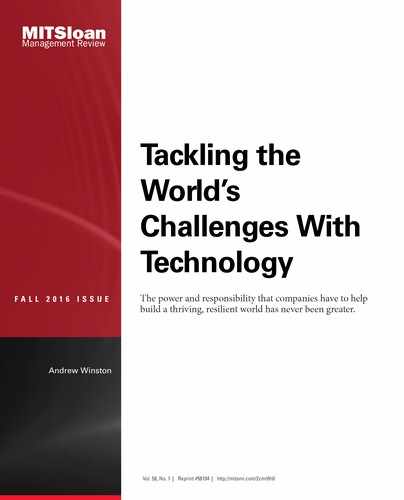Tackling the World’s Challenges With Technology
The power and responsibility that companies have to help build a thriving, resilient world has never been greater.
Editor’s Note: This article is one of a special series of 14 commissioned essays MIT Sloan Management Review is publishing to celebrate the launch of our new Frontiers initiative. Each essay gives the author’s response to this question:
“Within the next five years, how will technology change the practice of management in a way we have not yet witnessed?”
The next five to 10 years will be a critical time for humanity, in which we can leverage new technologies to address some of our biggest challenges: a dangerously changing climate; pressure on natural resources, especially water and food; and historic levels of inequality.
For decades, business leaders considered these systemic challenges as the domain of government and civil society. Companies, they thought, should focus on creating jobs and making money. But no longer. Expectations are rising fast that business should help tackle our societal challenges — and do it profitably. For example, in one recent study, fully 87% of millennials surveyed believe that the success of business should be measured in more than financial performance.
Technology will clearly shake up how organizations operate in every way — no part of management will go untouched in a world of big data, ubiquitous sensors, and powerful analytics providing new levels of insight. But perhaps the most powerful transformation will change how companies manage their relationships with the larger world.
Business, using technology wisely, will help build a thriving, resilient world. Of course, technology comes with its own environmental and social costs. Better AI and robots could mean fewer jobs. And the “cloud” itself is not actually very light on resources; our IT-based world requires very real — and sometimes hard-to-extract — metals, and it’s powered by a lot of energy. But the case for techno-optimism is strong. Consider how new hardware and software will both make businesses run better and improve our lives.
The Internet of Things, paired with smarter analytics, will help managers understand a company’s impacts on the world in much greater detail. They will know, for example, how much energy and carbon it takes to operate their business at global, brand, geographic, facility, and product levels. Once you measure something, you can manage it. Making better decisions about efficient use of resources is getting easier.
In the largest sectors of the economy, progress is coming quickly. The cost of renewable energy is dropping fast, making clean, distributed energy increasingly competitive with fossil fuels. Physical infrastructure is getting smarter and cleaner as well. New building systems can find heating and cooling systems that someone left on, or shut off lights and computers when nobody is around. These often highly effective operational improvements are becoming trivially easy to achieve.
More powerful computers and cheaper data will also make our transportation systems smarter. Companies with big fleets and good algorithms plot out delivery routes to eliminate unnecessary mileage. Self-driving cars create some operational and moral concerns, but cars in an autonomous system can move much closer together at a steady, energy-saving speed — and they’ll save lives. Data and technology are also helping to optimize infrastructure through resource sharing. Car sharing, apartment/room hopping, and worker “hoteling” (which allows an office building to house more people) are saving money and physical resources.
The sector with the largest footprint, food, is undergoing deep change as well. So-called “precision agriculture” — leveraging modern, computerized farm machines — enables farmers to apply fertilizer, pesticide, and water in exact, optimized amounts. And better data on the flow of food through the system should help reduce the monumental food waste that squanders precious embedded energy and water.
But as powerful as these rosy scenarios may seem, I suspect the biggest impact technology will have on societal challenges will be through the radical transparency it enables. New data on supply chains — and generations of workers raised to share everything — will open up everything a company does to public scrutiny. Someday soon, we will find it quaint that Volkswagen AG could conduct a large-scale fraud about their cars’ emissions. In the near future, such subterfuge will be impossible. People inside every company will be talking openly about their work on social media, and each car will have sensors collecting real-time emissions data.
Over the coming decade, I believe business will be at the core of helping humanity tackle climate change and manage our shared resources more equitably. Companies will willingly help build a thriving world both to generate profits and because customers, employees, and society will be watching closely and demanding better of them. The way we manage companies is undergoing a deep change: from focusing solely on shareholders to pleasing a broader array of stakeholders, from short-term focus to longer-term strategy, from pursuing operationally narrow goals to embracing collaborative systems thinking.
Technology is both forcing these changes and also offering solutions. That said, we’ll also need to change how we use the ultimate technology: our brains. A mindset shift, to rethink the purpose of business and its role in society, will make all the difference.
This article was originally published on August 10, 2016, with the title, “How Technology Will Enable Business to Solve the World’s Challenges.” It has been updated to reflect edits made for its inclusion in our Fall 2016 print edition.
Andrew Winston advises many of the world’s leading companies on how companies can navigate and profit from the humanity’s biggest challenges. He is a globally recognized speaker and writer on business strategy and mega trends. Andrew is the author of The Big Pivot and co-wrote the international bestseller Green to Gold.
Reprint 58104.
For ordering information, visit our FAQ page. Copyright © Massachusetts Institute of Technology, 2016. All rights reserved.
